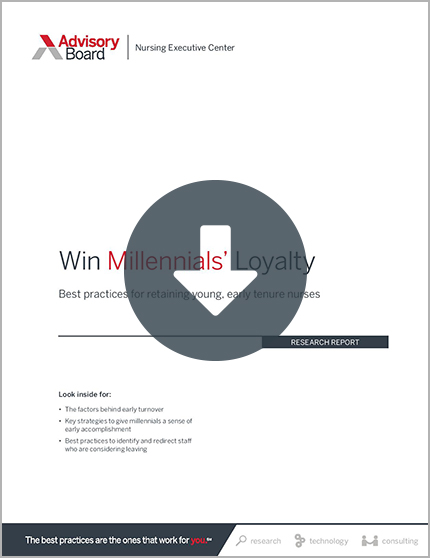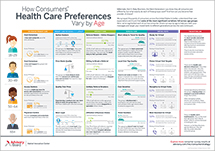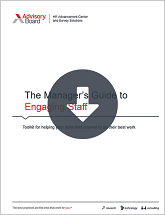Auto logout in seconds.
Continue LogoutRead Advisory Board's take: How should you prepare for Gen Z nurses?
Generation Z is entering the workforce, and their goals and motivations are distinctly different from their predecessors, Janet Adamy writes for the Wall Street Journal.
"Gen Z" encompasses the post-millennial generation—the estimated 67 million people born from 1997 through 2012. About 17 million Gen Zers are entering the workforce now, with many more expected in the years to come.
So what's Gen Z like? As Adamy writes, "They came of age during recessions, financial crises, war, terror threats, school shootings, and under the constant glare of technology and social media." As such, some demographers say they most closely resemble the Silent Generation—those born between 1928 and 1945—who grew up during the Great Depression and entered the workforce during the post-World War II economic boom of the 1950s and 1960s.
9 things employers should know about Gen Z
Gen Z's background has spurred a generation that experts say is risk-averse, highly attracted to financial security, and less inclined than previous generations to interact one-on-one.
Here are nine things you should know about the newest generation entering the workforce.
1. They crave financial security: Generation Z is prioritizing wages and benefits to a degree that researchers have not seen in years. A University of California, Los Angeles (UCLA) survey found 82% of college freshmen nationwide are prioritizing becoming well-off, which is the highest level the school has seen since it started the survey in 1966. Ray Blanchette, CEO of Ruby Tuesday, said young adults who come to work at Ruby Tuesday are often concerned about receiving health insurance and other benefits. "They're not even going to access these benefits that we offer, because they're staying on their parents plan, but they want to know it's there," said Blanchette.
2. They're dedicated to working: An annual survey from University of Michigan found the members of Gen Z now headed into the workforce were more likely than millennials to work overtime and to view work as a central part of their lives. Jean Twenge, a psychology professor at San Diego State University, said this "stronger work ethic" likely stems from the fear that "they're not going to get the good job that everybody says they need to make it."
3. But they don't want to own their own businesses: The Michigan survey, which researchers have conducted since the mid-1970s to gauge teens' evolving behaviors, found 30% of high school seniors in 2016 said they wanted to be self-employed. That rate is lower than those reported by millennials, baby boomers, and Gen X at the same age.
4. They're risk-averse: This risk aversion extends to student debt, Adamy writes. Gen Zers are doing their best to avoid the crippling student debt their millennial predecessors have faced, Adamy writes. The percentage of college freshmen using student loans to pay for college peaked in 2009 at 53%, according to UCLA's survey. Since then, that number has steadily declined, hitting 47% in 2016.
5. They're more racially diverse. According to Adamy, Census Bureau data show nearly 50% of Gen Zers "are a race other than non-Hispanic white." That's a larger share than any generation in U.S. history, Adamy writes.
6. They want hands-on managers: Bruce Tulgan, a management consultant at RainmakerThinking, said Gen Z places a great deal of trust in adults, and those entering the workforce want managers who will provide more granular feedback and will intercede in uncomfortable situations, such as co-worker conflicts. Tulgan said his company's survey found that having a "safe environment" was a key priority for Gen Zers.
7. They're more tech-savvy than their millennial predecessors. According to Adamy, Gen Z is the first generation to grow up in a fully connected world. This generation is used to learning things on YouTube and is constantly on their smartphones. Natasha Stough, the U.S. campus recruiting director at EY, said she was shocked when a new Gen Z employee proactively programmed the company's Facebook careers page to automatically answer questions.
8. They prefer independent work: Matt Stewart, co-founder of College Works Painting, said that when his company launched a new project to support branch managers, millennials were quick to team up and work together, while Gen Z workers preferred to work alone and to be incentivized with additional pay. Growing up using cell phones and social media has made Gen Zers more averse to individual interactions, Blanchette said. "[I]t's not natural or comfortable for them necessarily to interact one-on-one," he said.
9. They may be more likely to be anxious or depressed. According to UCLA's survey, about one in eight college freshmen frequently felt depressed in 2016—the highest level the survey has ever seen. Adamy writes that part of the blame can be placed on smartphones, as a lot of Gen Z's socializing takes place through text messages and on social media, which has "eroded natural interactions and allowed bullying to play out in front of wider audiences."
How employers are responding
Gen Zers unique traits have forced many employers to adapt to fill worker shortages, Adamy writes.
At College Works Painting, Stewart said, the company introduced bonuses of up to $3,000 to incentivize Gen Zers to participate in the company's project to help branch managers.
Other companies, like Ruby Tuesday, are changing their training videos to resemble videos found on YouTube that Gen Zers might be more used to. According to Blanchette, these employees "learn new information much more quickly than their predecessors."
To improve recruitment, EY launched a new job application feature that allows applicants to electronically submit a video of them answering interview questions. At Intuit, recruiters also began posting job openings to the messaging platform Slack to capture the attention of workers who don't pay close attention to email (Adamy, Wall Street Journal, 9/6).
Advisory Board's take: How should managers prepare for Gen Z nurses?


Marisa Deline, Practice Manager, Nursing Executive Center, and Anne Herleth, Consultant, Nursing Executive Center
Enter a nursing unit today and you'll likely run into many fresh faces. As nurses under 35 now make up one-third of the workforce, they've become a sizeable presence in nursing units—and also a new challenge for managers to understand.
As with each generation before them, a new age group tends to have their own cultural tendencies, job expectations, and professional assumptions. And parsing these can be hard. We've found this in our past research, where many nursing managers expressed that they had trouble understanding and engaging with nurses from the millennial generation.
“The difference with millennial nurses was loyalty”
In particular, many nursing leaders were confounded by a high turnover rate among millennials. They assumed that this was because this generation had inherently different job attitudes or were more likely to leave the hospital to chase higher wages. Yet our research found that millennial survey respondents were driven by the same engagement drivers (such as believing in the organization's mission and having promotion opportunities) as their older peers. The difference with millennials was loyalty.
Unlike most nurses, whose level of engagement tracks closely with their loyalty to the organization, highly engaged millennials within their first three years didn't necessarily report being more loyal. Armed with this insight, we spoke with nursing and HR leaders around the country and came up with 14 best practices for winning millennial loyalty.
But now nursing leaders have to understand and prepare for a whole new generation. So what will this Generation Z bring?
“In nursing, where it's so important to speak up, this could be a challenge for managers”
As this article shows, Gen Z is generally more timid and socially-anxious than their millennial counterparts. In nursing, where it's so important for young nurses to speak up and seek out mentorship from older nurses, this could be a challenge for managers. We've already heard anecdotally about this problem from nursing leaders who are just beginning to work with these new employees.
Yet, Gen Z could also bring more stability to the nursing workforce. Gen Z consistently indicates a strong craving for financial security. Perhaps this desire for stability, and expressed interest in making work a central part of their lives, could make Gen Z more loyal to their employers than millennials.
While, of course, much of this is speculation, what we do know is that this new generation will require managers to think about the new best ways to communicate with, engage and retain a new subset of employees. And while, at the margins, these strategies may change, the core components likely won't. To brush up, I recommend you download our resources on The Manager's Guide to Engaging Staff and The Manager's Guide to New Hire Onboarding.
Guide: Engaging Staff Guide: New Hire Onboarding
Millennials 101: What they want from their jobs, their PCPs, and more
Millennials are now the largest living generation—which means they're poised to become the backbone of your workforce and top utilizers of everything from primary care to maternity services to virtual visits. To help you understand this generation, we've collected some of our best resources on millennials.
Don't miss out on the latest Advisory Board insights
Create your free account to access 1 resource, including the latest research and webinars.
Want access without creating an account?
You have 1 free members-only resource remaining this month.
1 free members-only resources remaining
1 free members-only resources remaining
You've reached your limit of free insights
Become a member to access all of Advisory Board's resources, events, and experts
Never miss out on the latest innovative health care content tailored to you.
Benefits include:
You've reached your limit of free insights
Become a member to access all of Advisory Board's resources, events, and experts
Never miss out on the latest innovative health care content tailored to you.
Benefits include:
This content is available through your Curated Research partnership with Advisory Board. Click on ‘view this resource’ to read the full piece
Email ask@advisory.com to learn more
Click on ‘Become a Member’ to learn about the benefits of a Full-Access partnership with Advisory Board
Never miss out on the latest innovative health care content tailored to you.
Benefits Include:
This is for members only. Learn more.
Click on ‘Become a Member’ to learn about the benefits of a Full-Access partnership with Advisory Board
Never miss out on the latest innovative health care content tailored to you.



